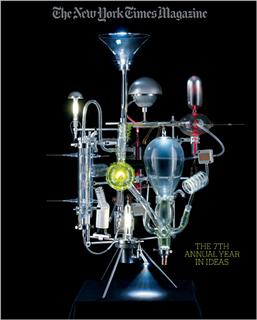 Each December the New York Times Sunday Magazine does a special issue that I always look forward to: their “Annual Year In Ideas” edition. It goes from A to Z with entries about a mind-boggling range–from the interesting to the utterly and truly wacky– of new discoveries, patents, theories, commodities that sprang into being over the course of the previous year.
Each December the New York Times Sunday Magazine does a special issue that I always look forward to: their “Annual Year In Ideas” edition. It goes from A to Z with entries about a mind-boggling range–from the interesting to the utterly and truly wacky– of new discoveries, patents, theories, commodities that sprang into being over the course of the previous year.
The 2007 issue had not only a few eccentric and odd entries (see “The ‘Cat Lady’ Conundrum“), but also a few interesting and funky religious ones.
Take a look at “The God Effect” for example, which asks “does thinking of an omniscient God actually promote altruism?”:
In a pair of studies published in Psychological Science, Norenzayan and his student Azim F. Shariff had participants play the so-called “dictator game,” a common way of measuring generosity toward strangers. The game is simple: you’re offered 10 $1 coins and told to take as many as you want and leave the rest for the player in the other room (who is, unbeknown to you, a research confederate). The fair split, of course, is 50-50, but most anonymous “dictators” play selfishly, leaving little or nothing for the other player. In the control group of Norenzayan’s study, the vast majority of participants kept everything or nearly everything — whether or not they said they were religious. “Religious leaders always complain that people don’t internalize religion, and they’re right,” Norenzayan observes. But is there a way to induce generosity? In the experimental condition, the researchers prompted thoughts of God using a well-established “priming” technique: participants, who again included both theists and atheists, first had to unscramble sentences containing words such as God, divine and sacred. That way, going into the dictator game, players had God on their minds without being consciously aware of it. Sure enough, the “God prime” worked like a charm, leading to fairer splits. Without the God prime, only 12 percent of the participants split the money evenly, but when primed with the religious words, 52 percent did.
Then there is something called “Interstellar Ramadan” for the practicing Muslim who also happens to be an astronaut:
“Astronauts align their daily prayer times with those at their points of departure, but if they can’t pray toward Mecca, the guidelines say, they can pray toward Earth itself. If they can’t find Earth, they can pray in any direction. (Chances are, if an astronaut can’t find Earth, he’s got other problems.) If it’s impossible to bow or lie down, they can gesture with their eyelids “for each prayer movement.” They are permitted to strike their hands against a wall or mirror instead of the ritual hand- and foot-washing but can eat nonhalal food “to alleviate hunger only.” The clerics also ruled that female Muslim astronauts should cover everything but their faces and the palms of their hands.”
How’s that for out there?


